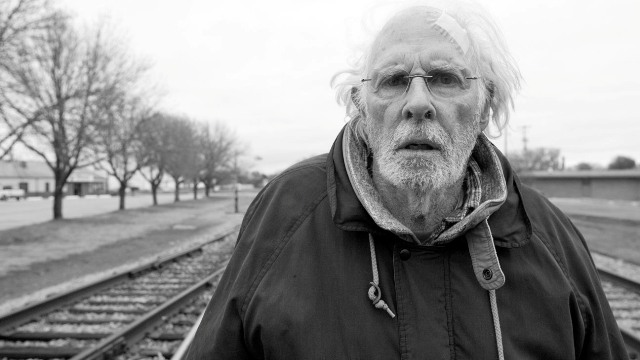MOVIE REVIEWS |
INTERVIEWS |
YOUTUBE |
NEWS
|
EDITORIALS | EVENTS |
AUDIO |
ESSAYS |
ARCHIVES |
CONTACT
|
PHOTOS |
COMING SOON|
EXAMINER.COM FILM ARTICLES
||HOME


Wednesday, November 27, 2013
MOVIE REVIEW Nebraska
Lost, But Alive, In A Late Year Fantasy

Bruce Dern as Woody Grant in Alexander Payne's comedy-drama "Nebraska".
Paramount Vantage
by
Omar P.L. Moore/PopcornReel.com
 FOLLOW
FOLLOW
Wednesday,
November 27,
2013
A priceless, evocative comedy-drama, Alexander Payne's
"Nebraska" is an absorbing meditation about Woody Grant, a drunken, curmudgeonly
octogenarian who's convinced he's struck it rich with a $1 million haul from a
Publishers' Clearing House-type outfit. Woody (Cannes 2013 best actor
winner Bruce Dern) compels his exasperated son David (Will Forte) to drive him
on a 19-hour journey to Nebraska to claim his prize.
The laconic Woody has little in the twilight of his life except this
dreamlike calling card to fame and glory. It's a fantasy he won't let go of.
That, and alcohol, are Woody's only reasons to live. David, who toils at his job, knows
the letter to Woody is absurd. Kate (June Squibb),
Woody's saucy, foul-mouthed wife, has particularly blunt feelings about Woody's
"win". She is the film's singular town crier, raising hell and gossip at
every turn about everyone. As Kate, Ms. Squibb, a likely Oscar nominee, is spectacularly
funny, employing a drop-dead, take no-prisoners approach to a character not
unlike other Payne film characters (she played one in "About Schmidt"), though
Bob Nelson wrote the crackling, whip-smart "Nebraska" screenplay.
In the confines of Lincoln, Nebraska word travels fast, and word of Woody's
chance to be a big fish in a small pond has already outrun him. Twin
brothers hilariously sniff out David for the crumbs of Woody's imagined riches,
as do others, including unscrupulous local Ed Pegram (a great Stacy
Keach), whose threats against the Grant family aren't idle. Ed
is the film's dark, brooding underbelly, embodying a side of Nebraska that
daytime smiles and quaint hospitality conceal. "Nebraska" takes stock in
its honest look at the state and its capital city, offering a different and
layered take on America's heartland, exploding and exposing some of its myths,
stereotypes and mysteries.
Mr. Forte, in his first major dramatic feature film acting, is excellent as
David, a quiet son whose melancholic demeanor and gradual warming to his father's stubborn quest for a
piece of the American dream is shrewdly internalized and modulated. These silent
percolations give "Nebraska" its sophistication and much of its risible drama.
Mr. Forte, whose work here is even more impressive than Mr. Dern's, matures on
screen before our eyes as the story progresses. He complements Mr. Dern
well, every bit the veteran actor's equal.
David arguably fights harder for the Grant family name than Woody does. Yet in his
own way Woody seeks to plant the Grant name in the soil of a town where whole
families catatonically stare at TV screens without so much as three sentences spoken between
them. Phedon Papamichael's fine cinematography captures plaintive and
vacant faces, each portraits of life. Mr. Payne's direction doesn't spare us their expression in bold, even daring
lingering still shots that allow us to absorb the fabric of their mundane and
idiosyncratic lives. There's a bluntness yet a tender, homely comfort in
these folksy men and women that connects us to them, even if most of us don't
live near Nebraska. For so long Mr. Payne has been adept at capturing the personality of the
environment he patrols, and is so exacting at punctuating the signature, unique identities contained within it.
"Nebraska" is a film brimming with immense confidence and a steady, unwavering
hand. Its larger-than-life figures form an artful, entertaining
anthropological study. Mr. Payne's cameras find the eccentricities in its
human subjects as well as in the town's plain, stark architecture.
Background signs in near-empty buildings say such things as, "don't even THIMK
about it". Mr. Payne's hometown is lovingly photographed, as is a cemetery
including a headstone that says PAYNE on it. Mr. Payne told me
recently that this headstone in his shot was sheer coincidence. "But it
may mean something," he said, in a moment of playful sarcasm. (Papadopoulos is his real last
name.)
Shot in glorious black and white, "Nebraska" captures the easygoing,
glacial-paced life of its residents and their attitudes. Some of the
characters are caustic, others cynical, still others naive, quirky or calculating.
Mr. Payne captures the authenticity of all of these types so resonantly and
unmistakably.
Each shot in "Nebraska" is indelible, a Rockwellian postcard of life, beauty and
humanity that unapologetically declares, "this is who we are."
Also with: Bob Odenkirk.
"Nebraska" is rated R by the Motion Picture Association Of America
for some language.
The film's running time is one hour and 55 minutes.
COPYRIGHT 2013. POPCORNREEL.COM. ALL RIGHTS RESERVED.  FOLLOW
FOLLOW
MOVIE REVIEWS |
INTERVIEWS |
YOUTUBE |
NEWS
|
EDITORIALS | EVENTS |
AUDIO |
ESSAYS |
ARCHIVES |
CONTACT
| PHOTOS |
COMING SOON|
EXAMINER.COM FILM ARTICLES
||HOME


 FOLLOW
TWEET
FOLLOW
TWEET FOLLOW
FOLLOW